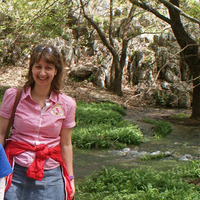- M.Ed in Science Education, University of Minnesota, Twin Cities
B.S Microbiology and Genetics, University of Minnesota, Twin Cities
B.A English, Aristotle University of Thessaloniki, Greeceedit
This paper presents a case study of a private preschool in Thessaloniki, Greece. The school, located at the unique setting of an educational farm, has a curriculum focus on environmental education. An analysis of teacher interviews and... more
This paper presents a case study of a private preschool in Thessaloniki, Greece. The school, located at the unique setting of an educational farm, has a curriculum focus on environmental education. An analysis of teacher interviews and lesson plans in the span of three years presents insights into the barriers teachers faced in implementing their environmental education curriculum, and the developments that occurred within this timeframe. Environmental education was found to not just be “a walk in the park,” but a personal growth journey for the teachers and the school as a whole. Teachers’ experiences implementing environmental education did not only improve their teaching methodology overall, but created a community of practice within the school.
Research Interests:
Οι πολλές αποχρώσεις/σκιές του CLIL: Μια μελέτη περίπτωσης εφαρμογής της CLIL από εκπαιδευτικούς της Αγγλικής σε μικρούς μαθητές σε ένα Ελληνικό ιδιωτικό σχολείο Eugenia ISKOS, Camilla RALLS and Sofia GEGKIOU This study hones in on the... more
Οι πολλές αποχρώσεις/σκιές του CLIL: Μια μελέτη περίπτωσης εφαρμογής της CLIL από εκπαιδευτικούς της Αγγλικής σε μικρούς μαθητές σε ένα Ελληνικό ιδιωτικό σχολείο Eugenia ISKOS, Camilla RALLS and Sofia GEGKIOU This study hones in on the practices and perceptions of a group of English teachers in a private school in Greece through analysis of semi-structured interviews and journals with NVIVO 7, a CAQDAS tool. The research was conducted to illuminate the application of CLIL at very young ages, pre-kindergarten to grade 3. Although there is a diverse application of CLIL at these ages, there are is common ground more so because of the teacher and school approach. Findings also showed that teachers find CLIL to be an integral part of their lessons. Barriers to CLIL for the teachers are mostly a need for collaboration with others, time and planning. Η εργασία αυτή εστιάζει στις πρακτικές και στις αντιλήψεις μιας ομάδας εκπαιδευτικών της αγγλικής γλώσσας ενός ιδιωτικού σχολείου στην Ελλάδα μέσα από την ανάλυση συνεντεύξεων και καταχωρήσεις ημερολογίων με τη χρήση NVIVO 7, ενός εργαλείου για ποιοτική ανάλυση. Η έρευνα διεξήχθη για να αναδείξει την εφαρμογή της μεθόδου CLIL σε πολύ μικρές ηλικίες, από το νηπιαγωγείο έως την 3 η τάξη του δημοτικού. Παρόλο που η εφαρμογή της CLIL γίνεται με διαφορετικό τρόπο σε αυτές τις ηλικίες, υπάρχουν κάποια κοινά στοιχεία λόγο των προσεγγίσεων των δασκάλων και του σχολικού περιβάλλοντος. Τα ευρήματα κατέδειξαν πως οι εκπαιδευτικοί θεωρούν ότι η CLIL αποτελεί αναπόσπαστο μέρος των μαθημάτων τους. Αυτά που θεωρούν εμπόδια για την εφαρμογή της CLIL είναι η ανάγκη συνεργασίες με τους συναδέλφους άλλων ειδικοτήτων, ο χρόνος και ο σχεδιασμός.
Research Interests:
This paper presents a case study of a private preschool in Thessaloniki, Greece. The school, located at the unique setting of an educational farm, has a curriculum focus on environmental education. An analysis of teacher interviews and... more
This paper presents a case study of a private preschool in Thessaloniki, Greece. The school, located at the unique setting of an educational farm, has a curriculum focus on environmental education. An analysis of teacher interviews and lesson plans in the span of three years presents insights into the barriers teachers faced in implementing their environmental education curriculum, and the developments that occurred within this timeframe. Environmental education was found to not just be " a walk in the park, " but a personal growth journey for the teachers and the school as a whole. Teachers' experiences implementing environmental education did not only improve their teaching methodology overall, but created a community of practice within the school. Le présent article expose l'étude de cas d'une école maternelle privée à Thessalonique, en Grèce. Cette école, située dans le contexte unique que constitue une ferme éducative, est dotée d'un programme axé sur l'éducation environnementale. L'analyse d'entretiens d'enseignants et de plans de cours sur une durée de trois ans, à l'aide d'un outil d'analyse de données qualitatives assisté par ordinateur, a donné des éclaircissements sur les obstacles qu'ont connus ces enseignants dans la mise en oeuvre de leur programme d'enseignement environnemental et sur le cours des évènements pendant cette période. L'éducation environnementale n'était pas seulement une « promenade de santé », mais aussi une aventure où les enseignants et l'école ont pu grandir. L'expérience des professeurs dans la mise en oeuvre de l'éducation environnementale a non seulement amélioré leur méthode d'enseignement en général, elle a également créé une communauté de pratique au sein de l'école.
